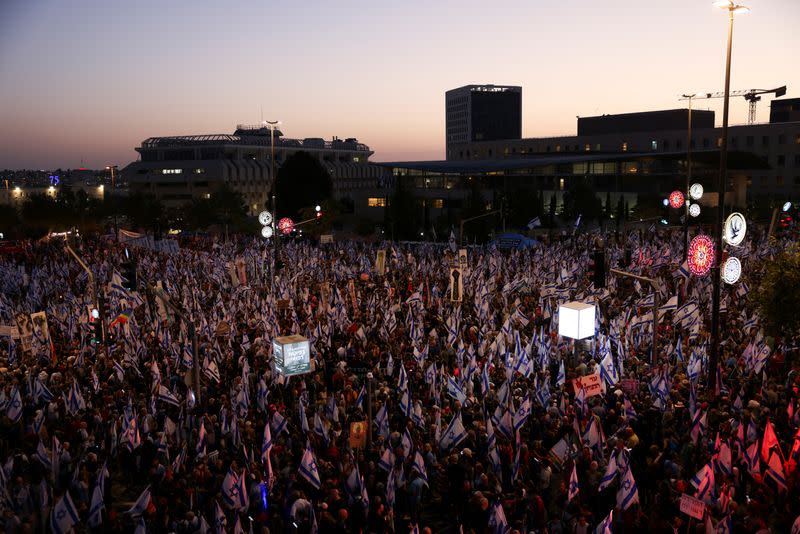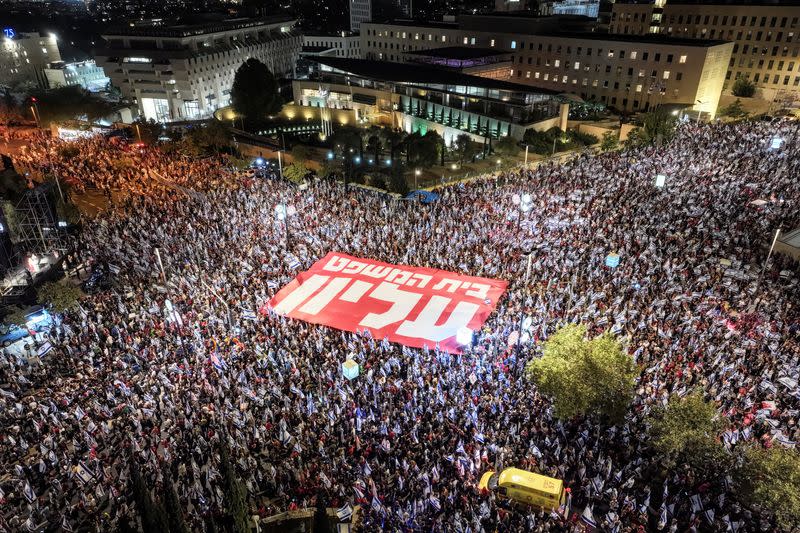Protests grip Israel ahead of historic Supreme Court session
- Oops!Something went wrong.Please try again later.
By Maayan Lubell
JERUSALEM (Reuters) -Thousands of Israeli anti-government protesters rallied at the Supreme Court on Monday, the eve of a historic hearing on a bid by Prime Minister Benjamin Netanyahu's coalition to curb the court's powers.
Forming a sea of blue and white Israeli flags, the protesters chanted "democracy" in a show of support for the Supreme Court, which on Tuesday will convene its entire 15-judge bench for the first time in Israeli history.
The judges will hear appeals against a judicial amendment that was passed by Netanyahu's national-religious coalition in July and which sparked uproar for what critics say is an attempt to weaken the court.
"Israel was always a democratic country, open, liberal," said protester David Leshem, "this government wants to change it and we are not going to let them."
The government's judicial overhaul campaign has caused Israel's worst domestic political crisis in years, with hundreds of thousands of people taking part in weekly demonstrations nationwide since January, when it was launched.
Critics say it damages the independence of the court, opens the door to corruption and weakens democracy, while supporters say it will restore balance between the judiciary, legislature and executive by reining in an overreaching bench.
Efforts to reach agreements between Netanyahu and opponents have so far been fruitless, adding to fears the crisis will only deepen.
However, a court ruling could come as late as January, leaving time for negotiations over agreed reforms that would offer a reprieve from the protests and market instability.
While some in Netanyahu's camp have joined calls for compromise, others are taking a tougher line.
Far-right police minister Itamar Ben-Gvir called on Netanyahu not to cave and said his party, Jewish Power, does not back the compromises being mediated by President Isaac Herzog.
Netanyahu's office responded by saying that if agreements are reached, no one will stop them from going through.
Though Netanyahu's political rivals have voiced scepticism over his intentions, Benny Gantz, one of the opposition leaders, said on Monday that: "If there is a solution on the table that will safeguard democracy, I'll be there."
'ANARCHY'
The appellants in Tuesday's hearing - opposition lawmakers and watchdog groups - say the amendment removes vital democratic checks and balances and invites abuses of power. They also argue that the swift legislation process was flawed.
In its legal response to the petitions, the government has said the Supreme Court has no authority to even review the so-called "reasonableness" amendment to a quasi-constitutional Basic Law, and said the debate could "lead to anarchy".
Netanyahu, who is on trial for corruption charges he denies, says the judicial changes are meant to balance a Supreme Court that has become too interventionist. He has been hazy when asked whether he would abide by a ruling that would quash the new law.
His coalition launched its judicial campaign in January, triggering unprecedented protests, spooking investors and sending the shekel down as Western allies voiced concern for the health of Israel's democracy.
The protest has also seeped into the military, with some reservists saying they would not report for voluntary duty, prompting defence chiefs to warn that Israel's war-readiness could be at risk.
(Reporting by Maayan Lubell;Editing by Angus MacSwan and Mark Potter)






